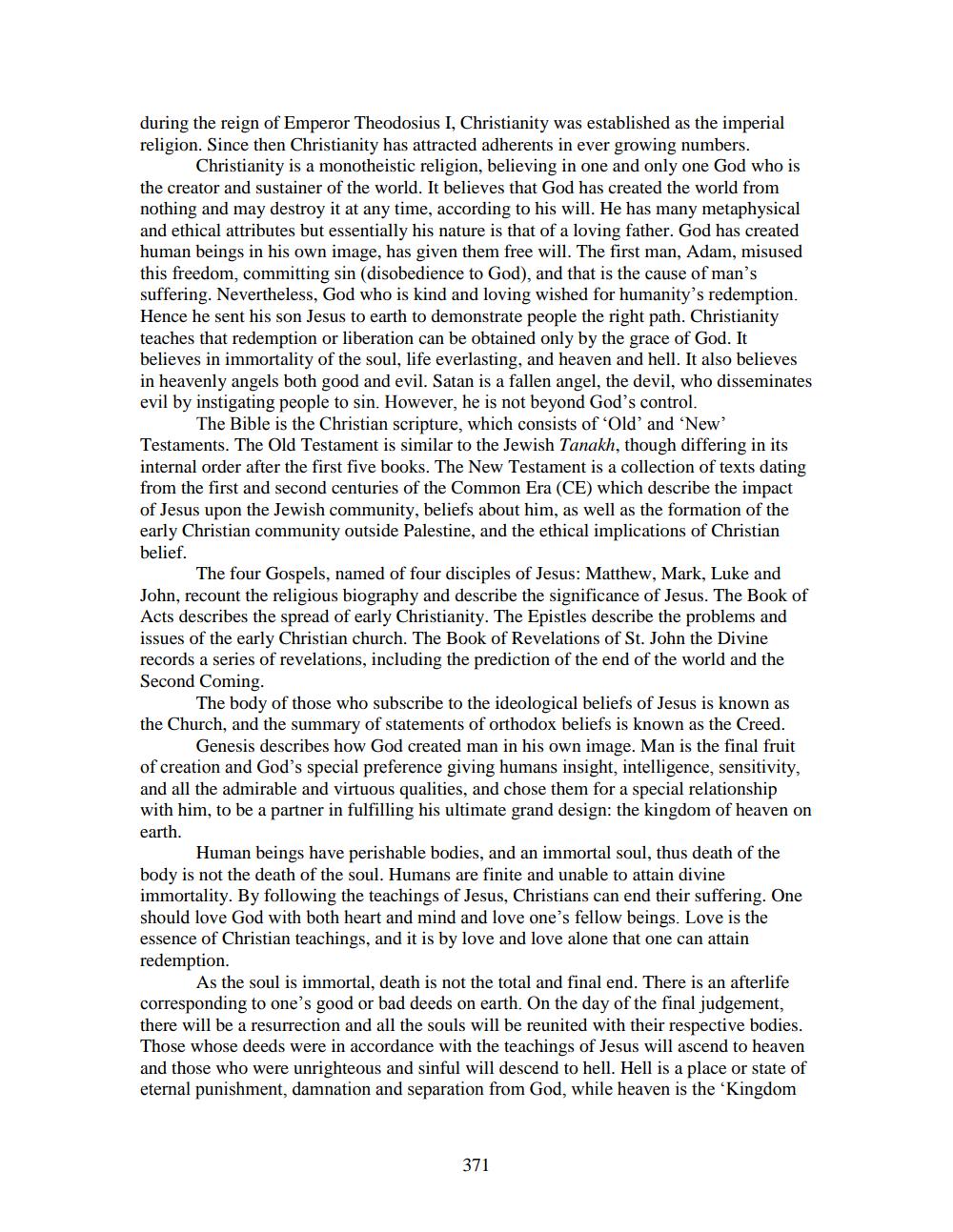________________
during the reign of Emperor Theodosius I, Christianity was established as the imperial religion. Since then Christianity has attracted adherents in ever growing numbers.
Christianity is a monotheistic religion, believing in one and only one God who is the creator and sustainer of the world. It believes that God has created the world from nothing and may destroy it at any time, according to his will. He has many metaphysical and ethical attributes but essentially his nature is that of a loving father. God has created human beings in his own image, has given them free will. The first man, Adam, misused this freedom, committing sin (disobedience to God), and that is the cause of man's suffering. Nevertheless, God who is kind and loving wished for humanity's redemption. Hence he sent his son Jesus to earth to demonstrate people the right path. Christianity teaches that redemption or liberation can be obtained only by the grace of God. It believes in immortality of the soul, life everlasting, and heaven and hell. It also believes in heavenly angels both good and evil. Satan is a fallen angel, the devil, who disseminates evil by instigating people to sin. However, he is not beyond God's control.
The Bible is the Christian scripture, which consists of 'Old' and 'New' Testaments. The Old Testament is similar to the Jewish Tanakh, though differing in its internal order after the first five books. The New Testament is a collection of texts dating from the first and second centuries of the Common Era (CE) which describe the impact of Jesus upon the Jewish community, beliefs about him, as well as the formation of the early Christian community outside Palestine, and the ethical implications of Christian belief.
The four Gospels, named of four disciples of Jesus: Matthew, Mark, Luke and John, recount the religious biography and describe the significance of Jesus. The Book of Acts describes the spread of early Christianity. The Epistles describe the problems and issues of the early Christian church. The Book of Revelations of St. John the Divine records a series of revelations, including the prediction of the end of the world and the Second Coming.
The body of those who subscribe to the ideological beliefs of Jesus is known as the Church, and the summary of statements of orthodox beliefs is known as the Creed.
Genesis describes how God created man in his own image. Man is the final fruit of creation and God's special preference giving humans insight, intelligence, sensitivity, and all the admirable and virtuous qualities, and chose them for a special relationship with him, to be a partner in fulfilling his ultimate grand design: the kingdom of heaven on earth.
Human beings have perishable bodies, and an immortal soul, thus death of the body is not the death of the soul. Humans are finite and unable to attain divine immortality. By following the teachings of Jesus, Christians can end their suffering. One should love God with both heart and mind and love one's fellow beings. Love is the essence of Christian teachings, and it is by love and love alone that one can attain redemption.
As the soul is immortal, death is not the total and final end. There is an afterlife corresponding to one's good or bad deeds on earth. On the day of the final judgement, there will be a resurrection and all the souls will be reunited with their respective bodies. Those whose deeds were in accordance with the teachings of Jesus will ascend to heaven and those who were unrighteous and sinful will descend to hell. Hell is a place or state of eternal punishment, damnation and separation from God, while heaven is the Kingdom
371




